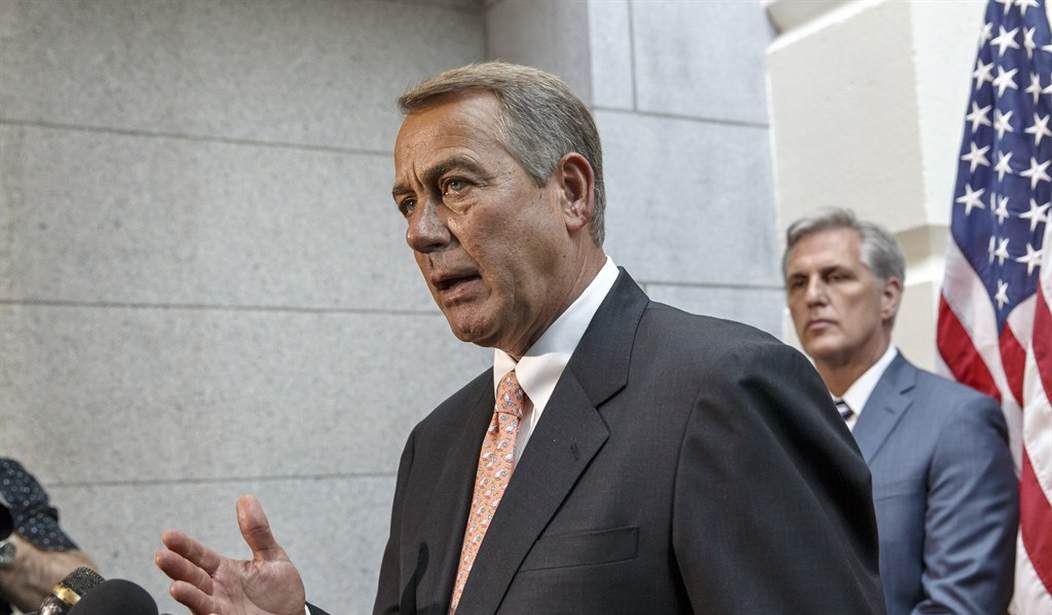With Dan Sullivan's race called, and Mary Landrieu's campaign cooling to room temperature, it is no longer premature to look to the first priorities of the next Congress and maybe even the lame duck session --a dangerous time, but also one in which some serious things can get done.
House Majority Leader Kevin McCarthy has made a sound argument for getting things done in the lame duck session that have "deadlines," so those deadlines don't screw up the roll-out of the GOP agenda --from budget to follow-through appropriations, Obamacare repeal efforts (whole or partial) and a variety of other reforms. That makes sense to me, but it also makes sense to get the Defense Authorization finished as soon as possible, and to get an immigration regularization bill back on the table in January, one that is relatively short and simple to understand, one whose Title One is a long, strong, double-sided fence the completion of which is a trigger for the provisions that follow in Title II. The president might kill this off with an executive order, but assume --it is very hard to do so-- that he will act as though the Constitution is more than a suggestion.
The most important, indeed pressing need, however, is to get resources to the Pentagon and to provide some clear strategic guidance in the form of legislation and appropriations and a new Authorization for the Use of Military Force ("AUMF") and not just for the struggle with ISIS but for the long war against the Islamists ahead.
The president wants funding for the troops dispatched to Africa. Of course he should get it but the bill funding that should also "plus up" DOD in ways that anticipate the sequester's end and a return to a rising Defense budget that is equal to the tasks spread out across the globe. The AUMF will take much longer to be crafted in a careful, precise way so as to make it durable for the challenges ahead.
Recommended
While the Islamists are one threat, Russia and especially China present the other major strategic challenges.
If you read nothing else, read this eyebrow raising piece from Tuesday's New York Times by Edward Wong. Henry Kissinger warned about the rise of his now more-needed-than-ever On China
The appearance of and growing strength --and voice-- of those "tigers" can be countered primarily by American naval power overall and specifically by carrier groups, SSBNs, and by the U.S. Fleet Cyber Command and the Tenth Fleet. Ship building takes a long, long time. Replacing the again 14 Ohio class "boomers" needs to start soon and will be very expensive. This Congress can get that project underway and the Navy's overall construction program revved up, and make sure at the same time that the former doesn't swallow the latter by taking every penny of new ship construction budget which it surely would under current spending trends. There needs to be an all out effort made to establish and fund a separate appropriations account for building the new SSBNs, as well as a general and critically needed "plus-up" across the board for DOD, but especially for the Navy and the Marine Corps. Explaining why, and in detail, will mark a great start to the new Congress.
As would a transparent and open immigration reform process. I hope the Senate GOP begins this effort by inviting a dozen or center-right journalists/broadcasters who cover immigration to a meeting with key senators and key House members to hear out the men and women who make the weather in the public square on immigration reform. Would it kill them to ask Michelle Malkin, Mark Levin and a dozen others to participate in a process-beginning conversation about what they believe and why?
Look, some folks won't like any bill. But I think most of the center-right commentators agree --say Barnes, Krauthammer and Will-- on most of what ought to be in an immigration reform bill, so rather than draft and try and sell it to the commentariat and then vainly hope that some or all of them will do so --tried and failed in 2006 and 2013-- start by asking a dozen or up to 20 folks with center-right platforms what they think and about what they will clap and how? Loudly? Golf clap? Screams of rage instead? Humility at the start will mean success at the end.
It isn't impossible to make immigration reform work, only difficult to do so. And it requires first genuine consultation with people who will cue the base whether, as with 2006 and 2013, any draft bill is fundamentally and fatally flawed.
Third time could be a charm --emphasis on "could."
























Join the conversation as a VIP Member